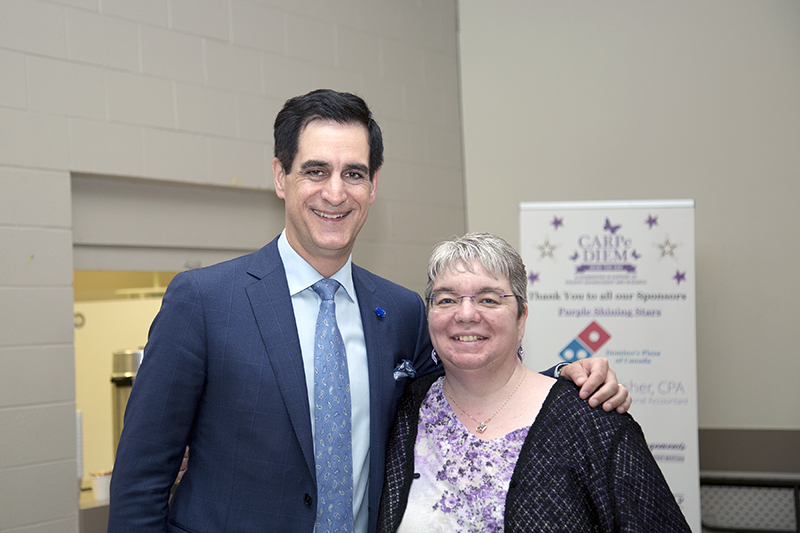Advocates for epilepsy. Dr. David Steven, Neurosurgeon, and chair of the Department of Clinical Neurological Sciences program at the London Health Sciences Centre – University Campus with Karen Fisher, of Ashton. Karen is a successful patient that suffered with seizures until Dr Steven performed brain surgery to control the seizures. Courtesy Photo
By Karen Fisher
AgriNews Contributor
Did you know that epilepsy affects 1 in 100 people? That’s approximately 300,000 Canadians and 65 million world wide. Many who have epilepsy do not tell others about their health condition due to the many misconceptions about the disease.
March is epilepsy awareness month and no better time to help stop the stigma surrounding the disease.
Epilepsy is the fourth most common neurological disease that affects people of all ages, young children and people over 65 are most common. It is a chronic disorder characterized by unpredicatable seizures caused by abnormal activity occuring in the brain. A person is diagnosed with epilepsy if they have two or more unprovoked seizures that were not caused by a known medical condition.
With over 40 different types of seizures they are commonly classified into two categories of either focal or generalized. Focal (or partial) seizures occur when the activity is limited to one brain hemisphere. Generalized seizures occur when there is widespread actvity in both the right and left hemispheres of the brain.
There is much more to epilepsy than seizures and most of these effects are “inside” and that is why it is often known as a HIDDEN illness. The following are just a few of the other impacts of the disorder:
- Depression
- Social activities
- Lifestyle changes
- Cognitive impairment
- Memory challegnes
- Limited independence
Having seizures affects a person’s relationships, work, safety, driving and many orther day to day aspects of life. There is no cure for epilepsy however, most cases are controlled by medication, although these medication may stop seizures they often lead to other challenges such as those listed. Approxamitely 30 percent of people with epilepsy are uncontrolled and may find help with brain surgery, ketogenic diet, vangus nerve stimulator and other alternative medicine.
In general, if someone is having a seizure the most important thing to do is stay calm, create a safe space, time it, provide reassurance, and if the seizures lasts more then 5 minutes or repeats without a full recovery call 911. Do not restrain the person or put anything in their mouth.
March 26th is national Purple Day for Epilepsy that was created by Cassidy Megan of Nova Scotia in 2008. People around the world wear purple and help raise awareness. We challenge you to show support and wear purple and show others they are not alone!
For more information or to find out more about epilepsy check out Epilepsy Ontario our provinical voice for epilepsy at www.epilepsyontario.org.
Public misunderstandings of epilspy cause challenges that are often worse than the seizures and impacts on health. Lets start a conversation, help educate others and ultimatly lets stop the stigma of epilspy.












